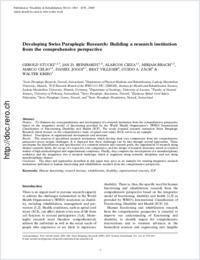Developing swiss paraplegic research: Building a research institution from the comprehensive perspective
- Stucki, Gerold Swiss Paraplegic Research, Nottwil, Switzerland
- Reinhardt, Jan D. Swiss Paraplegic Research, Nottwil, Switzerland - Department of Sociology, University of Lucerne, Switzerland
- Cieza, Alarcos Swiss Paraplegic Research, Nottwil, Switzerland - ICF Research Branch of the WHO CC FIC (DIMDI), Institute for Health and Rehabilitation Sciences, Ludwig-Maximilian University, Munich, Germany
- Brach, Mirjam Swiss Paraplegic Research, Nottwil, Switzerland - Department of Physical Medicine and Rehabilitation, Ludwig-Maximilian University, Munich, Germany
- Celio, Marco R. Swiss Paraplegic Research, Nottwil, Switzerland - Faculty of Natural Sciences, University of Fribourg, Switzerland
- Joggi, Daniel Swiss Paraplegic Association, Nottwil, Switzerland - European Spinal Cord Injury Federation
- Villiger, Beat Swiss Paraplegic Centre, Nottwil, Switzerland
- Zäch, Guido A. Swiss Paraplegic Foundation, Nottwil, Switzerland
- Krieg, Walter Swiss Paraplegic Research, Nottwil, Switzerland
-
2008
Published in:
- Disability & Rehabilitation. - 2008, vol. 30, no. 14, p. 1063 - 1078
English
Purpose. To illustrate the conceptualization and development of a research institution from the comprehensive perspective based on the integrative model of functioning provided by the World Health Organization's (WHO) International Classification of Functioning, Disability and Health (ICF). The newly founded research institution Swiss Paraplegic Research which focuses on the comprehensive study of spinal cord injury (SCI) serves as an example.Method. Description of organizational development and structure.Results. The creation of specialized research institutions which develop their core competence from the comprehensive perspective poses unique challenges. It is depicted how these challenges can be met through several approaches. These encompass the identification and specification of a common mission and research goals, the organization of research along distinct scientific fields, the set-up of a respective core competence, and the design of research structures suited to conduct studies of high methodological and organizational complexity. Finally, they comprise the development of a transdisciplinary workforce and the integration into a research landscape which is organized along scientific disciplines and not along interdisciplinary themes.Conclusion. The ideas and approaches described in this paper may serve as an example for creating integrative research institutions dedicated to human functioning and rehabilitation research from the comprehensive perspective.
- Faculty
- Faculté des sciences et de médecine
- Department
- Département de Médecine
- Language
-
- English
- Classification
- Medicine
- License
-
License undefined
- Identifiers
-
- RERO DOC 10555
- DOI 10.1080/09638280701456369
- Persistent URL
- https://folia.unifr.ch/unifr/documents/300841
Statistics
Document views: 166
File downloads:
- pdf: 224
